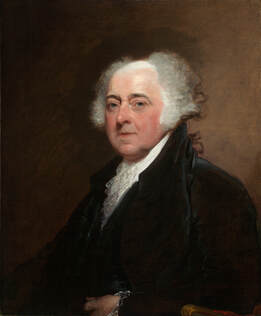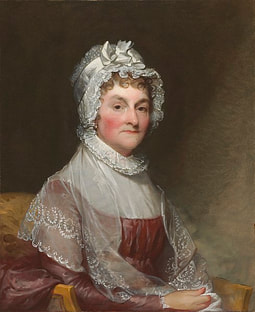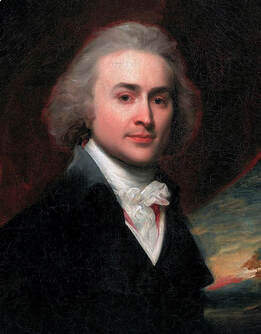Vertical Divider
|
In addition to National Literature and Poetry Month, April marks the anniversary of the opening battles of the American Revolution in 1775. Patriot and Revolutionary figures with literary connections to King’s Chapel are not just church members, but also visitors who wrote about their experiences at the church. What connects these three famous Adamses - John, Abigail, and John Quincy - to King’s Chapel are their written reflections on their visits. Each Adams visited at a different time, but each wrote about different types of revolutionary activity within the stone walls, ranging from a Patriot funeral in 1776 to the revolutionary transformation of the church’s liturgy in the 1780s.
John Adams (1735-1826), Patriot and the future second President of the United States, attended the same concert at King’s Chapel as George Washington in October, 1789 during Washington’s grand tour of the states that had ratified the Constitution. In a November 1, 1789 letter to his wife Abigail, John wrote of his visit, reflecting that Washington sat between Samuel Adams and John Hancock and how powerful it was to see the three revolutionary leaders together. Abigail Adams (1744-1818) knew the “Stone Chapell” as well. In April 1776, she came to King’s Chapel when it reopened during the Revolution for the funeral of Dr. Joseph Warren, a Patriot leader killed the previous summer at the Battle of Bunker Hill. After the British Troops evacuated Boston, he was given a proper funeral, right here. In an April 10 letter to John, Abigail described the service, and expressed the powerful words of King’s Chapel member Perez Morton in his eulogy. Morton’s eulogy can be read HERE. But it was not just John and Abigail Adams who had visited this church. Their son John Quincy Adams (1767-1848), who later became the sixth president of the United States, attended a wedding and services when he was eighteen in 1785. He wrote about his visit in his diary and in a letter to his mother, which describes the predicament of the church at that time: the church was without an ordained minister, and had recently revised their Book of Common Prayer earlier that year. As James Freeman was not ordained, Rev. Samuel Parker from Trinity Church conducted the marriage. Adams’ commentary on the King’s Chapel liturgy and prayer book under Freeman offers a glance into notions of religious freedom in the early republic. Read more about James Freeman’s writings HERE. |
Read Adams Family's writings about King's Chapel:
Abigail Adams, 1776
April 10, 1776, reflecting on Perez Morton's eulogy in King's Chapel at Dr. Joseph Warren's funeral:
“The Dr. [Joseph Warren] was Buried on monday the Masons walking in procession from the State House, with the Military in uniforms and a large concourse of people attending. He was carried into the Chaple , and their a funirel Dirge was played, an Excellent prayer by Dr. Cooper, and an oration by Mr. Morton which I hope will be printed. I think the Subject must have inspired him, a young fellow could not have wished a finer opportunity to have displayed his talents. The amiable and heroick virtues of the disceased resent recent in the minds of the Audience, the noble cause to which he fell a Martir, their own Sufferings and unparrelled injuries all fresh in their minds, must give weight and energy to whatever could be deliverd upon the occasion, the Dead Body like that of Caesars before their Eyes, whilst each wound, "like dumb mouths wounds did ope their ruby lips, and beg the voice and utterance of a Tongue.
'Woe to the Hands that shed this costly blood;
A curse shall light upon their line;
Domestick fury, and firce civil Strife
Shall cumber all the parts of Britton.'"
John Quincy Adams, 1785
Letter written in 1785, discussing James Freeman and the 1785 King's Chapel Book of Common Prayer::
Sunday 25th. Braintree
As the storm continued as violent as ever, in the morning, I staid in Boston; and went to Church at the Chapel. Parson Freeman, preach'd a very short Sermon, as he always does. He has adopted the anti trinitarian System, and makes use of a new form of Prayer. Many People have followed this new innovation, and I don't see, but there are as many Contests upon religious Points, as in any other-part of the world, although it is not carried to so great lengths. Mankind, will forever dispute whether the egg shall be broke, at the great or at the small end.
Diary entry in 1785, discussing liturgical changes at King's Chapel and freedom of religion:
This forenoon I was present at the marriage, of Mr. Nash and Miss Apthorp. They were married in the Chapel by Mr. Parker,(1) as Mr. Freeman,(2)the minister there, not having receiv'd orders, cannot perform the Ceremony. He was however present and in the Pulpit, where he was kind enough to give me a place. Mr. Tyler, who is intimate with him, introduced me to him.
It continued raining all night, and in the morning so that I could not go out of town. We went to the Chapel, and heard Mr. Freeman preach. This gentleman has adopted the antetrinitarian System, which has of late appear'd in this Country. Such religious freedom, as America, enjoys, must always have a tendency to increase the number of religious sects: but if this be a disadvantage, it is more than balanced by the liberal Sentiments which every sect adopts with respect to all the rest. After Church was over Mr. Tyler and myself, mounted our horses and cross'd the neck together; at Roxbury he left me, and went to his Mamma's. I proceeded to Braintree. I got to the meeting house, a little before the service began, and attended it. The weather clear'd up this afternoon, and promises to continue fair.
John Adams, 1789
November 1, 1789, reflecting on a concert at King's Chapel:
“I have Spent a Week in Boston which I have not done before these sixteen years. General Washington between Sam. Adams and John, The Fratum dulce Par, mounted up to View in the Stone Chapell and in Concert Hall to be Sure was a Spectacle for the Town of Boston. The Remarks were very shrewd. Behold three Men, Said One, who can make a Revolution when they please. There Said another are the three genuine Pivots of the Revolution. The First of these observations is not I hope so true as I fear the last is.”



